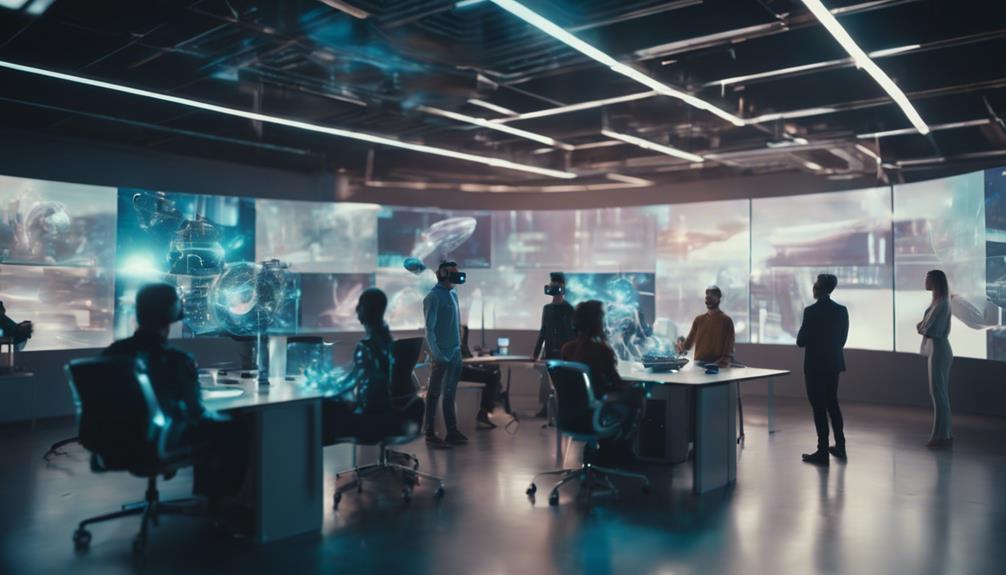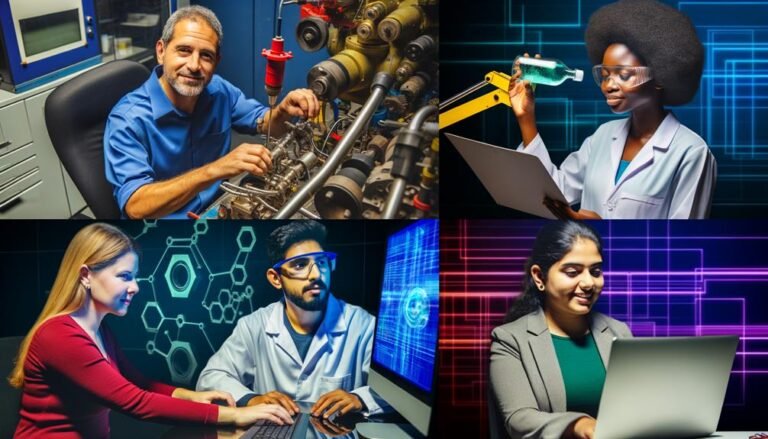What Is the Future of Work?
In the realm of work, the future unfolds as a tapestry woven with threads of innovation and adaptation. As we navigate through a landscape shaped by technological progress, workforce transformations, and the ripple effects of a global crisis, questions emerge about what lies ahead.
How will organizations harness the power of automation and artificial intelligence? What strategies will be pivotal in nurturing talent and fostering agility? The convergence of these factors paints a canvas of possibilities and challenges, prompting a deeper exploration of the path that lies ahead in the world of work.
Key Takeaways
- Remote work and flexibility will continue to grow, impacting traditional employment.
- Continuous upskilling and reskilling are crucial for adapting to technological advancements.
- Talent development professionals play a vital role in preparing the workforce for the future.
- Organizations must assess technology fit, embrace AI collaboration, and prioritize skill development.
Technology's Role in Future Work
In shaping the landscape of future work, technology stands as the cornerstone propelling innovation and redefining traditional paradigms.
AI integration and the impact of automation are revolutionizing decision-making processes, streamlining operations, and enhancing productivity in unprecedented ways.
Organizations embracing these technological advancements are gaining a competitive edge by automating routine tasks, freeing up human capital for more strategic endeavors.
The synergy between human intelligence and AI capabilities is fostering a new era of collaboration and efficiency in the workplace.
Talent Development Strategies
With the workforce landscape rapidly evolving due to technological advancements and changing demands, organizations must strategically align talent development strategies to ensure readiness for the future of work. Leadership development plays a crucial role in shaping the skills and competencies needed for tomorrow's leaders.
Performance management strategies need to adapt to incorporate continuous feedback and development opportunities to nurture talent effectively. By focusing on identifying and developing future-ready skills, organizations can stay ahead in the ever-changing business environment.
Embracing innovative approaches to talent development, such as personalized learning paths and mentorship programs, can enhance employee engagement and retention. As organizations navigate the complexities of the future of work, investing in talent development is key to building a sustainable and competitive workforce.
Implementing Emerging Technologies
Navigating the ever-evolving landscape of work demands a strategic integration of emerging technologies to drive organizational growth and adaptability. As technology continues to advance rapidly, organizations must engage in continuous technology assessment to stay ahead.
This involves constant monitoring of emerging trends, evaluating new technologies, and leveraging frameworks like the BUILDS framework for assessing technology fit. Moreover, the future of work will see a significant shift towards human-AI collaboration in the workplace, where artificial intelligence complements human capabilities to enhance productivity and decision-making processes.
Embracing AI collaboration and prioritizing technology assessment will be crucial for organizations looking to thrive in the dynamic and competitive work environment of tomorrow.
COVID-19's Influence on Work
Amidst the global upheaval caused by the COVID-19 pandemic, the landscape of work has experienced a profound transformation, propelling organizations towards a new era of remote collaboration and digital learning.
This shift has accelerated the adoption of hybrid work models, blending remote and in-person work settings. While remote work offers flexibility, it also presents challenges in maintaining team cohesion.
Organizations are now focusing on innovative strategies to foster connection and collaboration among team members, leveraging technology to bridge physical gaps. As we navigate these changes, cultivating a sense of belonging and shared purpose becomes paramount for enhancing productivity and employee satisfaction in hybrid work models.
Embracing these shifts will be crucial in shaping the future of work post-pandemic.
Organizational Readiness Assessment
In assessing organizational readiness for the future workforce, a strategic evaluation of reskilling, upskilling, and new skilling needs within the company is imperative. To effectively evaluate preparedness for the evolving work landscape, consider the following assessment strategies:
- Conduct a comprehensive skills gap analysis to identify areas needing development.
- Implement regular training needs assessments to stay ahead of skill requirements.
- Utilize feedback mechanisms to gauge employee satisfaction with training programs.
- Evaluate the effectiveness of current learning and development initiatives.
- Continuously monitor industry trends and technological advancements to align training programs accordingly.
Remote Work and Flexibility Trends
With the evolving landscape of work requirements becoming increasingly dynamic, the embrace of Remote Work and Flexibility Trends is essential for organizations aiming to thrive in the future of work. Flexible scheduling and work-life balance are key components that empower employees to manage their time effectively. Remote collaboration and virtual teams facilitate seamless communication and productivity regardless of physical location. Embracing these trends not only enhances employee satisfaction but also expands the talent pool by enabling access to a diverse range of professionals worldwide. Organizations that prioritize flexibility and remote work strategies are better positioned to attract and retain top talent, adapt to changing work environments, and foster a culture of innovation and collaboration.
| Flexibility Trends | Remote Work Benefits | Virtual Collaboration |
|---|---|---|
| Flexible scheduling | Increased productivity | Seamless communication |
| Work-life balance | Access to global talent | Enhanced teamwork |
| Remote work policies | Cost savings | Real-time project updates |
| Telecommuting options | Employee satisfaction | Digital collaboration tools |
| Adaptability to change | Expanded talent pool | Efficient decision-making |
Upskilling and Reskilling Initiatives
To meet the evolving demands of the future workforce, organizations must proactively implement targeted upskilling and reskilling initiatives that align with emerging trends and technologies.
- Skills Transformation: Implement programs that focus on transforming existing skills to meet future needs.
- Training Programs: Develop comprehensive training programs to equip employees with the necessary skills.
- Career Advancement: Provide learning opportunities that pave the way for career advancement within the organization.
- Learning Opportunities: Offer diverse learning opportunities to cater to different learning styles and preferences.
- Continuous Development: Emphasize continuous learning and development to ensure employees stay ahead in a rapidly changing work environment.
Balancing Productivity and Employee Needs
Strategically harmonizing operational efficiency with employee well-being stands as the cornerstone of optimizing organizational performance in the modern work landscape. Achieving a balance between productivity and employee needs is essential for fostering a thriving work environment.
Prioritizing employee well-being through mental health support initiatives and promoting work-life harmony can lead to enhanced job satisfaction and overall productivity. Organizations that invest in supporting their employees' well-being often experience lower turnover rates and increased engagement levels.
Conclusion
In conclusion, the evolving landscape of work presents a multitude of challenges and opportunities for organizations to navigate. Embracing technological advancements, prioritizing talent development, and adapting to the changing workforce dynamics are crucial for success in the future.
By assessing organizational readiness, implementing emerging technologies, and fostering a culture of continuous learning, businesses can thrive in the transformative era ahead.
The future of work is a complex mosaic of innovation and adaptation, requiring strategic foresight and agility.







